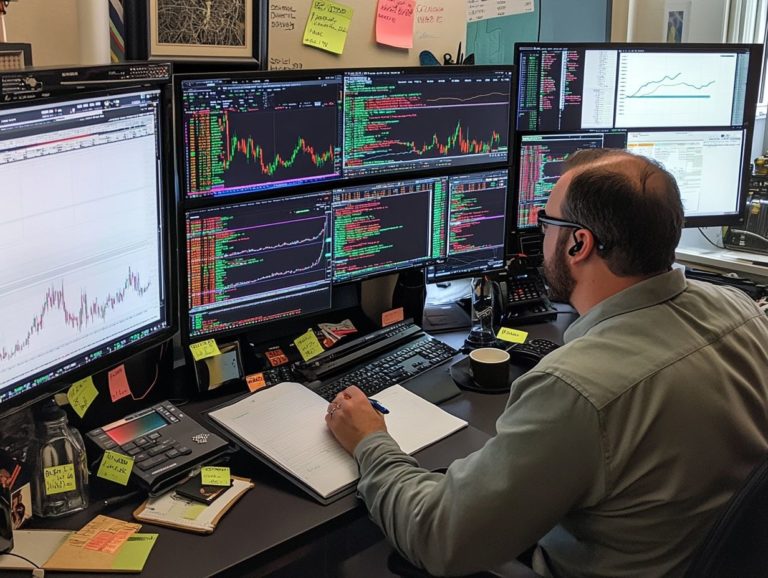5 Strategies to Enhance Your Trading Mindset
Success in trading goes beyond just having a strategy and market knowledge; it is profoundly shaped by your mindset.
This article delves into five essential strategies designed to elevate your trading mindset. It will guide you from identifying personal goals to cultivating a disciplined approach. Additionally, it addresses the psychological hurdles that traders frequently encounter such as fear and greed and outlines how to foster a positive outlook that enhances your decision-making capabilities.
Are you ready to transform your trading experience and elevate your success now? Let s embark on this journey together!
Contents
- Key Takeaways:
- 1. Identify Your Trading Goals and Objectives
- 2. Develop a Trading Plan
- 3. Practice Discipline and Patience
- 4. Learn to Manage Your Emotions
- 5. Continuously Educate Yourself
- Why Is Having the Right Mindset Important in Trading?
- Frequently Asked Questions
- Here are 5 strategies to boost your trading mindset:
- How can setting clear goals improve my trading mindset?
- Why is self-reflection an important strategy for traders?
- How does maintaining a positive attitude benefit traders?
- Why is managing emotions crucial for traders?
- How does continuous learning and adaptation help to enhance your trading mindset?
Key Takeaways:

- Set clear trading goals and objectives to stay focused and motivated.
- Craft a comprehensive trading plan to guide your actions and decisions.
- Practice discipline and patience to avoid impulsive and emotional trading.
1. Identify Your Trading Goals and Objectives
Identifying your trading goals and objectives serves as the foundation of a successful trading venture. When your trading strategy matches your personal goals, you create a clear path to success.
As you contemplate your trading goals, it’s essential to distinguish between short-term and long-term objectives. Short-term traders often chase quick gains through methods like day trading or swing trading. Meanwhile, those with a long-term vision might favor a buy-and-hold strategy, capitalizing on broader market trends.
Understanding your risk tolerance how much risk you are comfortable taking is crucial, as it profoundly influences your decision-making. If you lean towards risk aversion, you might gravitate towards more conservative strategies, whereas a bolder trader could embrace higher stakes.
Regular self-assessment against predetermined benchmarks allows you to measure your performance. Checking your progress lets you tweak your strategy for better results, highlighting the importance of self-awareness.
2. Develop a Trading Plan
A well-structured trading plan is essential for navigating market conditions effectively. It outlines your trading strategy, risk management techniques, and the specific rules you’ll adhere to in order to achieve consistent trading success.
Your comprehensive plan should incorporate clear entry and exit strategies tailored to various market scenarios. This ensures that you know precisely when to seize opportunities and when to step back to minimize losses.
Strong risk management is key to protecting your capital, with defined stop-loss levels serving as a crucial component to mitigate potential downturns. For example, during volatile market conditions, implementing a tighter stop-loss may be the best way to shield yourself against abrupt price movements.
Being adaptable in your trading plan helps you adjust your strategy according to market changes or economic indicators, ultimately increasing your chances of achieving successful trading outcomes.
3. Practice Discipline and Patience
Practicing discipline and patience is essential in trading; these qualities empower you to steer clear of impulsive decisions driven by emotions. By doing so, you significantly reduce the likelihood of trading mistakes, fostering a more stable trading psychology.
When you cultivate these traits, you create an environment where rational analysis prevails over erratic behavior. This foundation becomes even more critical during periods of market volatility, where the urge to act on instinct can increase the risk of significant losses.
Understanding the psychological challenges that arise in trading, such as fear and greed, is vital. To successfully navigate these hurdles, strategies like mindfulness can help you maintain focus. Additionally, learning how to leverage your mindset for better trading and setting realistic trading goals enables measured progression on your trading journey.
Together, these approaches build resilience, ultimately leading to more confident and profitable trades.
4. Learn to Manage Your Emotions

Managing your emotions is crucial in trading. It profoundly influences your decision-making and performance, especially during market volatility driven by fear and greed.
You might find yourself swept up in a storm of emotions that cloud your judgment. This can lead to snap judgments that stray from your carefully crafted strategies. A key to achieving success in this arena lies in understanding your emotions. This helps you identify your personal emotional triggers and builds resilience during challenging market conditions.
Techniques like mindfulness meditation can be incredibly effective in helping you stay grounded. You can also keep a trading journal to reflect on your emotional responses and decision-making patterns. By cultivating this awareness, you can better manage impulses driven by fear or greed. For more insights, consider exploring 5 tips for building emotional resilience in trading. This ensures your trading strategies stay aligned with your long-term goals rather than being swayed by fleeting whims.
5. Continuously Educate Yourself
Continuous education is essential in the trading world. By keeping yourself updated on market developments and gaining insights into various financial instruments, you can enhance your trading techniques and elevate your overall experience.
Traders who engage in ongoing learning through resources like webinars, articles, and trading communities find themselves better equipped to navigate the market’s complexities. These platforms offer both theoretical knowledge and practical insights that can significantly refine your strategies.
Regular market updates and thorough trading analysis are crucial for adapting to the ever-changing landscape. By staying attuned to economic indicators, trends, and expert opinions, you can make informed decisions that bolster your chances of success and foster confidence in your trading journey.
Why Is Having the Right Mindset Important in Trading?
Having the right mindset in trading is crucial; it shapes your emotional discipline, decision-making process, and, ultimately, your trading performance. It aligns closely with your trader DNA and individual journey.
Your mental state can significantly influence the outcomes you achieve in the markets. For example, when you face a losing streak, maintaining a constructive attitude allows you to critically analyze your strategies without falling into despair. To enhance your mindset, consider exploring 5 ways to stay motivated as a trader. This resilience gives you the power to learn from your mistakes instead of dwelling on them, enabling you to pivot your methodologies effectively.
Emotional discipline helps you manage those impulsive urges that can arise during periods of market volatility, like the temptation to overtrade or chase after losses.
By cultivating a robust mental framework, you position yourself to navigate challenges with greater ease. This keeps your focus on your long-term goals, ultimately enhancing your trading performance.
What Are the Common Mindset Traps in Trading?
Common mindset traps in trading often ensnare you with snap judgments fueled by fear and greed. These can lead to significant mistakes and derail your strategy.
These psychological barriers can take on various forms. For instance, overconfidence may cause you to overestimate your knowledge or abilities, pushing you toward reckless decisions. This issue is often exacerbated by FOMO (Fear of Missing Out), compelling you to jump into trades just to avoid missing out on potential profits, or by loss aversion, where the fear of losing prevents you from cutting your losses in a timely manner.
To effectively navigate these challenges, it’s essential to cultivate emotional discipline and a heightened sense of self-awareness. Establishing a structured trading plan, embracing mindfulness practices, and regularly reflecting on your past trades can help you mitigate impulsive behaviors and foster more rational decision-making. Additionally, considering tips for enhancing mental clarity in trading can further support your journey.
How Can You Overcome Fear and Greed in Trading?

Overcoming fear and greed in trading is crucial for maintaining a disciplined mindset and optimizing your performance. These emotions can easily cloud your judgment and push you into hasty investment decisions.
It s important to recognize that these feelings are entirely natural. However, effectively managing them can truly set you apart. For instance, implementing clear trading rules establishes a consistent framework that significantly reduces your vulnerability to impulsive reactions.
Successful traders often use stop-loss orders, a tool that automatically sells your stocks at a certain price to limit losses, to safeguard their investments from unexpected market dips. This ensures they adhere to their set exit plans.
Developing a structured trading plan with specific goals and risk management techniques allows you to stay focused and not be swayed by fleeting market sentiments. A noteworthy example is a seasoned trader who used journaling to track his emotional state, ultimately leading to enhanced decision-making and increased profitability.
What Are the Benefits of Having a Positive Mindset in Trading?
A positive mindset in trading can significantly enhance your emotional discipline and improve your decision-making. Ultimately, it leads to greater success, as it aligns with your trader DNA and prepares you to navigate the complexities of the financial markets. To strengthen this approach, consider learning how to develop a winning trading mindset.
When you cultivate a constructive outlook, you ll find yourself better equipped to manage risks and sidestep hasty decisions driven by fear or excitement. By staying calm during market fluctuations, you are more likely to adhere to your pre-established strategies instead of impulsively chasing potential gains.
This self-awareness enables you to recognize your emotional triggers. It allows you to take necessary breaks and evaluate your strategies with a clear mind. Implementing techniques for stress management in trading ultimately helps you approach each trade with optimism, transforming how you interpret losses and viewing them as valuable learning experiences that lay the groundwork for future successes.
How Can You Maintain a Healthy Work-Life Balance in Trading?
Maintaining a healthy work-life balance in trading is crucial for your emotional stability and overall well-being. This balance allows you to navigate your trading journey with clarity and discipline.
By establishing clear trading hours, you can create effective boundaries that separate your professional and personal lives. This significantly reduces the risk of burnout.
Taking regular breaks during the day not only boosts your productivity but also provides the mental space necessary for sound decision-making. Engaging in hobbies outside of trading be it exercising, reading, or spending quality time with loved ones can greatly alleviate stress and cultivate a more positive mindset.
A balanced approach is key, as your emotional stability directly impacts the quality of decisions you make in the often unpredictable trading environment.
What Are the Best Practices for Developing a Strong Trading Mindset?
Developing a strong trading mindset requires you to embrace best practices that improve your focus. This journey ultimately leads to enhanced trading focus and fewer mistakes in your trading endeavors.
Among these best practices, journaling your trading experiences stands out as an essential tool. This reflective exercise gives you the power to analyze your decisions and emotions during specific trades, deepening your understanding of personal triggers.
Maintaining emotional discipline is crucial; it enables you to adhere to your established plans, even amidst the chaos of market volatility. Regularly reviewing your trading strategies not only fine-tunes your approaches but also encourages you to adapt to ever-changing market conditions.
Engaging in continuous learning and self-reflection can significantly bolster your resilience, equipping you to tackle challenges with confidence and adaptability.
Frequently Asked Questions

What should I do if I feel overwhelmed while trading?
It’s essential to take breaks, practice mindfulness, and return with a fresh perspective.
How can journaling help improve my trading?
Journaling allows you to track your decisions and emotions, helping you identify patterns and improve your strategies.
What are stop-loss orders, and how do they work?
Stop-loss orders automatically sell your stocks at a predetermined price, helping to limit your losses during market fluctuations.
Here are 5 strategies to boost your trading mindset:
Set clear goals, practice self-reflection, maintain positivity, manage emotions, and keep learning.
How can setting clear goals improve my trading mindset?
Clear goals keep you focused and motivated. They give direction to your trading and help you track progress.
Why is self-reflection an important strategy for traders?
Self-reflection means analyzing your trading performance. This helps you learn from mistakes and improve your strategies.
How does maintaining a positive attitude benefit traders?
A positive attitude helps traders stay calm during challenges. It encourages rational decisions rather than impulsive ones.
Why is managing emotions crucial for traders?
Trading stirs emotions like fear and excitement. Learning to control these emotions leads to better decision-making.
How does continuous learning and adaptation help to enhance your trading mindset?
The markets change constantly. By learning and adapting, traders can refine their strategies and boost profits.






